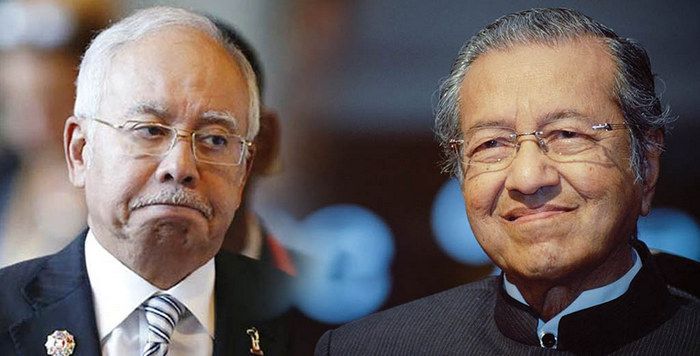

By Fathol Zaman Bukhari


Although it is over three weeks since the 14th General Election on Wednesday, May 9, Malaysians on the whole, are still in awe with the unexpected outcome. Many are still in a state of disbelief, shock would be a better word. The celebrations, in fact, have not abated, as the joy of a “second Merdeka” has engulfed the whole nation. For those who witnessed the raising of the national flag at the stroke of midnight on August 31, 1957 at the Selangor Club Padang would recall, it was simply ecstatic.
The end of six decades of one party rule may come as a surprise to some but to me it is a dream come true. And the only similarity I can allude to was the defeat of the Indian Congress Party in 1977 after 30 years of monolithic rule following independence from Great Britain in 1947.
I have been waiting for this miracle to happen since I first voted in the 6th General Election of 1982. Being in the army, postal voting was the norm then and still is today. Whether my vote had made an impact I am in no position to ascertain as postal vote, as is generally known, is not only flawed but is highly contentious.
I was in command of a territorial regiment based in Seremban when the 9th General Election was held in 1995. Representations were made by the officials from Barisan Nasional, the ruling coalition, requesting permission for certain politicians to deliver ceramah in the camp. I had to accede as this was sanctioned by the Ministry of Defence. It was a one-way flow of information as soldiers did not hear anything from the opposite side.
Well, that was then. But with Pakatan Harapan now at the helm the narrative is set to change. Perhaps it is time to ban postal voting in its entirety, as it is very often abused by the ruling party. I doubted whether my ballot paper reached its destination. In all probability it was replaced along the way by a very compliant Election Commission staff.
The success of a military operation depends much on the kind of intelligence acquired. In all four phases of war, intelligence is the key factor and is the chief determinant. It is widely believed that faulty intelligence and blind arrogance were the major causes of Barisan Nasional’s defeat in the recently-concluded 14th General Election. Intelligence sources are varied. They can come from people on the ground, the Police Special Branch and the military.
It was obvious that Umno supporters voted against the party and the coalition. In three-cornered fights, the Islamist party, PAS got the bulk of the Malay votes over non-Umno component parties. That explained why Kelantan and Terengganu fell to PAS.
Former Prime Minister, Najib Razak, was constantly in denial not wanting to accept reports by the Police Special Branch as they were not in his favour. His arrogance stemmed from the belief that nothing could go wrong for the incumbent, as things were stacked in his favour. The “tacit” support by a pliant Election Commission and the many goodies he had promised potential voters, in the lead to the election, had inadvertently lulled Najib into a false sense of security much at his behest.
The man from Pekan, Pahang had underestimated the pulling power of Tun Mahathir. The old fox, at 92 years of age, is still a force to reckon with. Najib had made snide remarks at his former mentor which backfired on him.
In a short span of two years Tun Mahathir has turned the informal Pakatan Harapan pact from a rag-tag band into true giant killers defeating Barisan Nasional that he helped shaped and – until Wednesday, May 9, 2018 – was invincible. The party that had never tasted defeat at federal level in all the years since Merdeka, for the very first time, is now on the outside looking in. Accompanying Umno into unchartered waters are its complementary partners, MCA, MIC and Gerakan. They were soundly beaten and recovery, to my mind, is next to impossible.
Najib has since relinquished the presidency of Umno accepting full responsibility for the election defeat. Without the largesse to keep members content, party leadership can expect a stormy reception at the party election on June 30. There are already calls for all top positions in the party to be contested. And suggestions have been made to open Umno to all races, something unheard of a few weeks ago.
Barisan Nasional’s defeat in Perak, although narrow, unravelled some interesting episodes. Islamist party, PAS, with its three elected representatives hoped to be the power broker but was left high and dry when two BN assemblymen crossed the floor to join Pakatan Harapan. Having undergone a painful experience, a repeat of the February 2009 debacle was averted. Pakatan Harapan with a four-seat majority in the state assembly will be in charge for the next five years. Former Menteri Besar Zambry Abd Kadir will be the Opposition Leader forthwith.
Ahmad Faizal Azumu, the sole representative from Mahathir’s Parti Pribumi, was sworn in as Menteri Besar along with 10 executive councillors at Istana Iskandariah, Kuala Kangsar on Saturday, May 19 and Monday, May 21, respectively.
Faizal has an unenviable task to perform. High on his list of priorities is to improve Perak’s economy which has been languishing at the bottom of the table for a period of time. The state is the second poorest in the peninsula, a rung above Kelantan. There is a string of financial scandals attributed to the previous administration. The accounts of state-linked entities such as MB Incorporated, SS Incorporated and state foundation, Yayasan Bina Upaya need to be audited and their past performance re-evaluated. According to an inside source money acquired by these companies was “fair game for the corrupt”.
Another irritant is MAPS (Movie Animation Park Studios) in Meru. Built at an estimated cost of RM500, 000 million the theme park barely makes RM1 million in ticket sales a month. With such meagre income servicing the loan will be problematic in the months to come. Perak Corporation Berhad (PCB), a subsidiary of the Perak State Economic Development Corporation (SEDC) incurred a loss of RM 340.6 million in 2017, the biggest in the group’s history. Theme park, MAPS, is among its liabilities. Those responsible should be penalised.
Faizal, in his maiden executive council meeting on Wednesday, May 23, mandated that all local councillors would have their service terminated with immediate effect. Termination of service of village chiefs would be effective on June 30. New councillors and village heads will be appointed. The position of Ipoh’s current mayor, Dato’ Zamri Man and Council Secretary, Mohd Zakuan Zakaria is not known as yet. Being federal appointees the continuation of their service rests with the Menteri Besar. He exercises the option.
To get the best out of Ipoh City Council may I suggest a return to the much-vaunted local council elections last held in 1963. That is the only way to make the Council answerable to long-suffering Ipohites. Pakatan Harapan’s victory on May 9 provides hopes of a vibrant Ipoh City Council with an elected mayor and councillors at the forefront.


